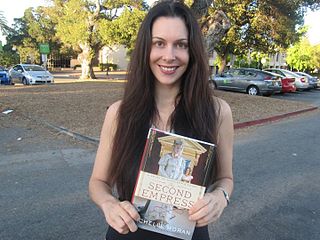A Quote by Thomas Paine
The end of all political associations is the preservation of the natural and imprescriptible rights of man; and these rights are liberty, property, security, and resistance of oppression.
Quote Topics
Related Quotes
And these great natural rights may be reduced to three principal or primary articles: the right of personal security; the right of personal liberty; and the right of private property; because as there is no other known method of compulsion, or of abridging man's natural free will, but by an infringement or diminution of one or other of these important rights, the preservation of these, inviolate, may justly be said to include the preservation of our civil immunities in their largest and most extensive sense.
I typically don't use the distinction 'positive' and 'negative' liberty, because negative sounds bad and positive sounds good, and I don't think that the terminology ought to prejudice us one way or the other. So I think the more descriptive term is 'liberty rights' versus 'welfare rights'. So, liberty rights are freedom-of-action type rights, and welfare rights are rights-to-stuff, of various kinds...And, property rights are not rights-to-stuff. I think that's one of the key misunderstandings about property. Property rights are the rights to liberty within your jurisdiction.
Among the natural rights of the colonists are these: first, a right to life; second, to liberty; third, to property; together with the right to support and defend them in the best manner they can. These are evident branches of ... the duty of self-preservation, commonly called the first law of nature. All men have a right to remain in a state of nature as long as they please; and in case of intolerable oppression, civil or religious, to leave the society they belong to, and ernter into another.... Now what liberty can there be where property is taken away without consent?
It is not the right of property which is protected, but the right to property. Property, per se, has no rights; but the individual - the man - has three great rights, equally sacred from arbitrary interference: the right to his life, the right to his liberty, the right to his property The three rights are so bound together as to be essentially one right. To give a man his life but to deny him his liberty, is to take from him all that makes his life worth living. To give him his liberty but take from him the property which is the fruit and badge of his liberty is to still leave him a slave.
In short, it is the greatest absurdity to suppose it in the power of one, or any number of men, at the entering into society, to renounce their essential natural rights, or the means of preserving those rights; when the grand end of civil government, from the very nature of its institution, is for the support, protection, and defence of those very rights; the principal of which, as is before observed, are Life, Liberty, and Property.
My position as regards the monied interests can be put in a few words. In every civilized society property rights must be carefully safeguarded; ordinarily and in the great majority of cases, human rights and property rights are fundamentally and in the long run, identical; but when it clearly appears that there is a real conflict between them, human rights must have the upper hand; for property belongs to man and not man to property.
It has been the fashion to speak of the conflict between human rights and property rights, and from this it has come to be widely believed that the use of private property is tainted with evil and should not be espoused by rational and civilized men... the only dependable foundation of personal liberty is the personal economic security of private property. The Good Society.
It is evident that the right of acquiring and possessing property, and having it protected, is one of the natural, inherent, and unalienable rights of man. Men have a sense of property: Property is necessary to their subsistence, and correspondent to their natural wants and desires; its security was one of the objects, that induced them to unite in society. No man would become a member of a community, in which he could not enjoy the fruits of his honest labour and industry.
The only proper, moral purpose of a government is to protect man's rights, which means: to protect him from physical violence - to protect his right to his own life, to his own liberty, to his own property and to the pursuit of his own happiness. Without property rights, no other rights are possible.
The Universal Declaration of Human Rights recognizes that 'if man is not to be compelled to have recourse, as a last resort, to rebellion against tyranny and oppression', human rights should be protected by the rule of law. That just laws which uphold human rights are the necessary foundation of peace and security would be denied only by closed minds which interpret peace as the silence of all opposition and security as the assurance of their own power.
We hear in these days a great deal respecting rights--the rights of private judgment, the rights of labor, the rights of property, and the rights of man. Rights are grand things, divine things in this world of God's; but the way in which we expound these rights, alas! seems to me to be the very incarnation of selfishness. I can see nothing very noble in a man who is forever going about calling for his own rights. Alas! alas! for the man who feels nothing more grand in this wondrous, divine world than his own rights.



































